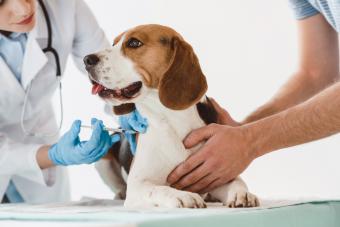
It is important for dog owners to learn the symptoms of kennel cough in order to seek appropriate veterinary treatment. Without medical attention, some forms of kennel cough can develop into a potentially life-threatening illness. While coughs can indicate a number of different canine health conditions, kennel cough has a specific set of symptoms.
What Is Kennel Cough?
Kennel cough, also known as canine infectious tracheobronchitis, is a highly contagious respiratory disease that can affect dogs of all ages. The airborne infection spreads when a dog comes in contact with another infected dog. The condition can be caused by a viral or bacterial infection. Many types of viruses and bacteria can cause the same symptoms in an affected dog.

Bordetella bronchiseptica is the most common bacterial cause of kennel cough. Bordetella is related to the bacteria that causes whooping cough in human beings. Viral causes of kennel cough include canine parainfluenza virus and canine adenovirus-2.
Symptoms of Kennel Cough
Kennel cough symptoms generally appear about three to four days after the dog has been exposed to the infection. Some dogs may not show symptoms until eight to 10 days after exposure to the disease. Each case of kennel cough is unique, and not every dog will exhibit each symptom of the condition. Common symptoms can include:
- A persistent dry, hacking cough
- Coughing fits that cause the dog to gag and throw up saliva
- A runny nose
- Lack of energy and general tiredness
- Trouble sleeping
- Loss of appetite
- Conjunctivitis of the eye with discharge
- A sticky saliva around the corners of the mouth
- Fever
- Depression
- Thick yellow nasal discharge
- Difficulty breathing
- Phlegm-producing cough
How to Recognize Kennel Cough
Kennel cough may resemble other ailments. However, symptoms of kennel cough usually share the following key elements:
- Symptoms appear after the dog has spent time with other dogs, such as in a boarding kennel, doggie day care, dog park, or grooming facility.
- The persistent cough occurs randomly, but it may also be triggered by exercise, excitement, or any pressure on the neck area.
- The deep, dry cough sounds as if the dog has something stuck in their throat. It may also sound like a goose "honk."
- The coughing fits are loud, forceful, and generally last a few minutes. The fits occur frequently.
- Coughing fits sometimes cause the dog to retch a white, foamy discharge.
Other Conditions with Similar Symptoms
A number of health conditions share similar symptoms to kennel cough. These conditions include:
- Heartworm infection
- Canine distemper
- Chronic bronchitis or chronic obstructive pulmonary disease
- Allergic bronchitis
- Pneumonia
- Congestive heart failure
- Collapsing trachea
- Obstructions in the trachea
- Valley fever
Treatment for Kennel Cough
A dog with a mild case of kennel cough will have a persistent dry cough, but may still be active and eating well. These dogs often improve within five days with supportive care and rest, and may completely recover within ten days. In fact, mild cases of kennel cough may not require any medication. However, because kennel cough is so contagious, it's imperative you do not allow your dog to interact with any other dogs while they recover, which means no dog park visits or even walks in public where you may pass other dogs.
In many cases, a dog will not improve within five days and will, instead, develop more serious symptoms. If left untreated, the illness could progress to pneumonia. Therefore, a visit with your veterinarian is always warranted to make sure your dog is on the mend.
For progressive cases, your veterinarian may prescribe cough suppressants to alleviate coughing symptoms along with antibiotics, especially if a secondary infection is suspected or if the lungs are congested. Most dogs recover within three weeks with treatment. Many human cough medications are not safe for dogs, so never give any medicine without the guidance of your veterinarian.
Prevent Kennel Cough with Precautions
The best way to protect your dog from kennel cough is through vaccination. The Bordetella vaccine will not prevent kennel cough entirely, but it will lessen the severity of the symptoms if your dog is exposed to the bacteria. This vaccine is generally recommended for dogs who frequent the groomer, boarding facilities, day care, or dog parks. Depending on your area and your dog's exposure risk, your veterinarian may recommend vaccination every 6 months or annually.

Recognize Symptoms Early to Keep Your Dog Safe
Any dog owner with a dog that presents the symptoms of kennel cough or any other respiratory disturbance should immediately isolate the pet from other dogs (in the home or outside), then consult a veterinarian. A veterinarian can determine the appropriate diagnosis and course of treatment. Early treatment can prevent serious health complications to keep your dog safe and healthy.







